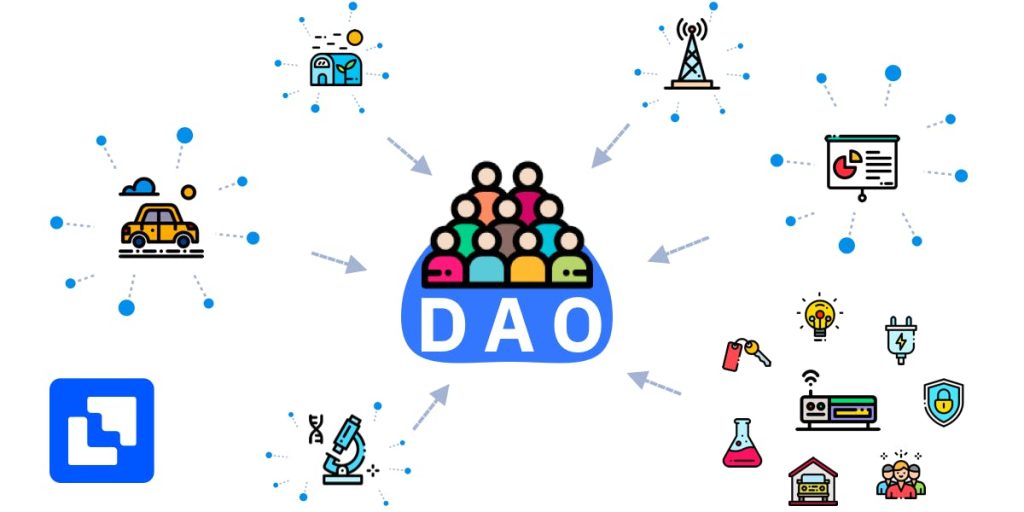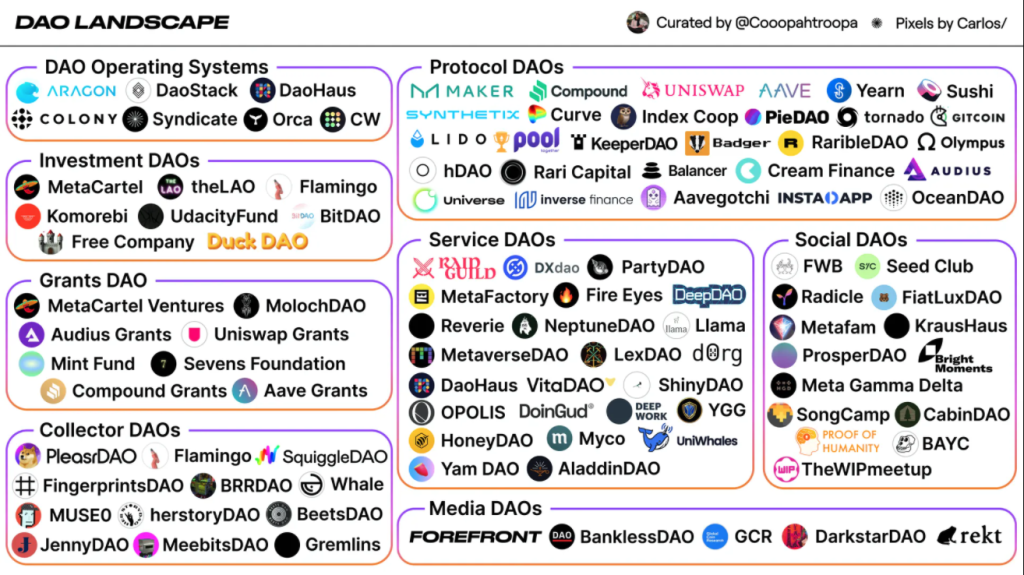The term “Decentralized Autonomous Organization” (DAO) refers to a group that is run by its members and has no central leadership. Smart contracts provide the ground rules, carry out the choices that have been mutually agreed upon, and may be subjected to public auditing at any time, including proposals, votes, and even the code itself.
Members of a decentralized autonomous organization (DAO) have complete control over the organization’s direction and fate, deciding issues like funding and infrastructure development.
Members of the community make recommendations for how the protocol should be run going forward, and everyone gets together to vote on those proposals. If a certain threshold of agreement is reached on a proposal, the rules instantiated inside the smart contract will accept and enforce the proposal. Organizational hierarchies, such as those seen in major organizations, are replaced by grassroots efforts under this model. Every DAO participant acts as a gatekeeper for the protocol.
The incentive alignment is a key feature of this framework’s beauty. It means that it is in everyone’s best advantage to vote honestly and to support only those proposals that are to the protocol’s long-term benefit. With more people using the system, the tokens that each DAO participant owns will rise in value. Token holders will benefit along with the system itself.
How Does a DAO Function?
A group of influential participants in the DAO’s community uses smart contracts to define the organization’s regulations. The DAO’s operational structure is outlined in these smart contracts. In order to ensure that each prospective member has a thorough understanding of how the protocol is to work at any given stage, they are extremely transparent, verifiable, and publicly auditable.
Following the formalization of these rules on the blockchain, the DAO must choose how to acquire capital and delegate authority. Token issuance is the protocol’s standard means of accumulating capital for the DAO’s reserves. Token holders get specific voting rights in exchange for their currency investments. The DAO may be launched after financing is finalized.
Once the code has been released to production, it can no longer be modified unless by a unanimous vote of all members. That is, the rules of the DAO may be altered in no way by anybody other than the token holders themselves.

Decentralized Autonomous Organizations. Examples
In recent years, DAOs have gained popularity. They are now routinely used in many blockchain initiatives. DAOs are used, for instance, to provide complete decentralization of applications in the DeFi (decentralized finance) sector.
Some people consider the Bitcoin (BTC) network to be the first such example of a DAO. Though most members of the network have never met, the network grows by consensus. It lacks a centralized administration system and relies on endorsements from the network’s miners and nodes instead.
In contrast, Bitcoin is not considered a DAO by modern criteria.
Dash includes a governance structure that enables stakeholders to vote on the usage of its treasury, making it the first real DAO by current standards.
Stablecoins backed by cryptocurrencies were introduced by other, more sophisticated DAOs, such as decentralized networks based on the Ethereum blockchain. Some of the groups behind DAO creation eventually lose relevance as they cede management of the initiative to others. In order to recruit new contributors, issue new tokens as collateral for their currencies, or alter other characteristics, token holders may vote on governance proposals.
A DeFi lending system issued its own governance token in 2020 and mined it for use in the network. Tokens would be given out to almost everyone who participated in the protocol. Since then, the approach has been adopted by other projects and modified to fit their needs.
There is a long list of DAOs to choose from now. The idea has crystallized and gained momentum over time. It’s important to note that although some projects are still aiming for full decentralization through the DAO model, they’re still in their infancy and have a ways to go before they reach their ultimate aims and objectives.

Popular DAOs
DAOhaus is a code-free DAO infrastructure deployment and management tool. The community runs and owns it. There’s all the info you need to launch your own DAO or just get a feel for the thriving ecosystem.
With MakerDAO, users may participate in protocol governance by voting on updates to the Maker protocol, which launched the world’s first unbiased stable token, DAI.
When it comes to Web3, nobody does it quite like RaidGuild, a service-based DAO with its roots in the MetaCartel ecosystem. As such, the guild is always on the lookout for talented individuals to join their ranks and help them in their quest to rid the world of evil products.
Since DAOs are born online, they may usher forth a new era of corporate management. More and more institutions may adopt a DAO model to control parts of their operations as the idea develops and the legal gray area they operate in is clarified.


